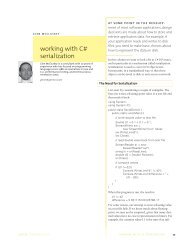inside:
inside:
inside:
You also want an ePaper? Increase the reach of your titles
YUMPU automatically turns print PDFs into web optimized ePapers that Google loves.
C# types<br />
by Glen<br />
McCluskey<br />
Glen McCluskey is a<br />
consultant with 20<br />
years of experience<br />
and has focused on<br />
programming languages<br />
since 1988.<br />
He specializes in Java<br />
and C++ performance,<br />
testing, and<br />
technical documentation<br />
areas.<br />
glenm@glenmccl.com<br />
In our examination thus far of the C# language, we’ve<br />
looked at the overall architecture and also discussed<br />
some basics of compiling and executing programs. In<br />
this column we’ll start to consider the various types that<br />
C# offers.<br />
C# is an object-oriented language, and its type system thus centers<br />
around system-provided and user-defined classes, classes<br />
that represent an abstraction of some sort (such as a calendar<br />
date or a geometric X,Y point). All the details of how classes<br />
work cannot be covered in a single column, and we’ll touch on<br />
them only briefly in this initial presentation.<br />
Built-in Types<br />
C# offers a standard set of built-in data types, such as short,<br />
long, and double. These are similar to the corresponding types<br />
in C/C++. They have a standard size; for example, long is 64<br />
bits. Values of the char type hold a single Unicode character (16<br />
bits); an 8-bit unsigned byte type exists as well.<br />
One substantial difference from C is the provision of a decimal<br />
type, in addition to the usual floating-point types float and<br />
double. Floating-point arithmetic does poorly at handling decimal<br />
calculations (e.g., payroll deductions), and the decimal type<br />
offers an alternative. Here’s an example of where it matters:<br />
using System;<br />
public class Dec {<br />
public static void Main() {<br />
// add 0.1 to itself twice and compare to 0.3,<br />
// using the double type<br />
double dbl = 0.1;<br />
if (dbl + dbl + dbl == 0.3)<br />
Console.WriteLine("double is equal");<br />
else<br />
Console.WriteLine("double is unequal");<br />
// the same, but using the decimal type<br />
}<br />
}<br />
decimal dec = 0.1m;<br />
if (dec + dec + dec == 0.3m)<br />
Console.WriteLine("decimal is equal");<br />
else<br />
Console.WriteLine("decimal is unequal");<br />
Using a double type, 0.1 added to itself three times does not<br />
result in 0.3, due to floating-point representation problems: 0.1<br />
is the sum of an infinite series of negative powers of two<br />
(0.00110011001...) and therefore is not exactly representable in<br />
floating-point format. The decimal type solves this problem<br />
and is useful in areas such as financial calculations. Of course,<br />
it’s a bit slower in execution.<br />
Another difference from C is the string type. Here’s an example:<br />
using System;<br />
public class String {<br />
public static void Main() {<br />
string s = "testing";<br />
Console.WriteLine(s);<br />
}<br />
}<br />
A rich set of functions for manipulating strings is also available.<br />
Type-Checking and Conversions<br />
C# applies tighter type-checking rules to the use of built-in<br />
types than C and C++. For example, in this code:<br />
using System;<br />
public class Conv {<br />
public static void Main() {<br />
ulong a = 0xffffffff;<br />
uint b;<br />
}<br />
}<br />
//b = a;<br />
b = (uint)a;<br />
an explicit cast is required to convert the unsigned long value to<br />
unsigned int. Such conversion often represents a programming<br />
mistake, and the programmer is required to specify explicitly<br />
that the conversion is desired (and, presumably, to consider its<br />
implications).<br />
A related example is the use of Boolean expressions:<br />
using System;<br />
public class Bool {<br />
public static void Main() {<br />
int x = 100;<br />
● PROGRAMMING<br />
June 2003 ;login:<br />
LOOKING AT C# TYPES ●<br />
19














